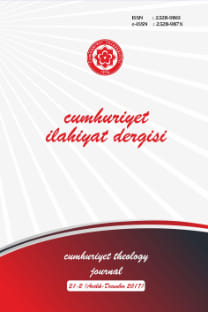Ahlak-Vahiy İlişkisi ve Kur'an'da İman-Ahlak-Amel Bütünlüğü
Ahlak, insan ilişkilerinde "iyi" veya "doğru" veyahut "kötü" veya "yanlış" olarak adlandıFdığımız değer yargılarını Ifade eder. Bazı ahlak kuralları hukuka temel oluşturabileceği gibi hukuk kuralı haline de gelebilir. Ahlak anlayışında sosyal, kültürel ve diğer faktörlerin etkisiyle toplumdan topluma farklılıklar olmasına rağme,n, ahlakı tamamen rölatif bir zemine oturtamayız. Normatif ahlak kuralları, Insanlığın başlangıcından gü- nümüze kadar vahly süreci ile teyit edilen, Insan fıtratından. kaynaklanan, din, felsefe, mistisizm ve tasavvuf ile derinlik kazçnan evrensel bir boyuta sahiptir. İman-ahlak ilişkisi açısından, Tanrı'nın varlığından ahiakl tecrübeye veya da ahlaki tecrübeden Tanrı'nın varlı~ına gitmeye yönelik çabalar Insanlık tarihinin en eski dönemlerln'e kadar gitmektedir. Hayatın anlam ve gayesini sorgulamayan, sadece "nasıl?" sorusuyla uğc raşarak formüller içerisinde boğulmuş bir aklı, ruhunu yitirmiş, mekanik ve soğuk bir akıl olarak görmek mümkündür. İmani destekten yoksun bir ahlaki prensip duygu planında yeterince temellenmemiş olup toplumda kolektif bir şuurun oluşturulmasında yetersiz kalır. Kur'an, oluşturmayı amaçladığı Insan ve toplumla ilgili değerleri ikame ederken, önce bu değerlerin üzerine kurulacağı bilgi ve. lman zeminini oluşturmakta, ontolojik olarak hayat, evren ve Insan varlığının anlam ve gayesi ile ilgili doğru bilgllendirmeyi esas almaktadır. Kur'an, Insanların akıllarına hitap ettiği kadar gönül dünyaianna da hitap etmiştir. Kur'an'da ibadet ve muamelat (fıkıh) konuları lman ve ahlakla iç lçedir. İslam'da hiçbir ibadet ve muamelat prensibi yoktur ki iman ve ahiakla bütünleşmemiş olsun.
Ahlak-Vahiy İlişkisi ve Kur'an'da İman-Ahlak-Amel Bütünlüğü
Ethlcs expresses the moral judgements that we cari cal! good or .bad, true or wrong. in human relatlons. Same· moral values can form a ground for law as well as they may become prlnciples of law. Despite same differences in consideration of ethics from one soclety to the qther under the _lnfluence of social, cultural and other conditions, we cannot put ethics on the relative grourıd absolutely. The normative moral. princlples confirmed by the process of revelation have universal dimeQslon that orlglnate from .the human nature and deepen with rellglon, philosophy; mystlcism and Sufism from the very beginning of history. From the angle of belief-ethits connection, the struggles that try to go to the existence of Gad maving from the moral experience or tries to gÖ to the moral experience maving from the exlstence of Gad date back to the. oldest periods of history. It is posslble to see an lntellect deallng only wlth thı;! question of "how?" and so drowning In formuias as a cold and mechanlc lntellect that lost !ts saul. A moral principle deprived of the support of fa ith ·ıs not rooted In sentlml!nts sufficiently and so cannot form a collective conscious In the soclety regarding lt. Flrst, the Qur'an has formed the ground of knowledge and fa ith to establish the values on it while fixing the values connected with-the individual and society that,it aims to create. The Qur'an _has addressed human beings' world of lnteilect as well as addressing their world of heart. The subject of prayer and conducts ls related to the subject of belief and ethics In Islam one within the other. In Islam· there is no prlnclple of prayer and conduct that does not become lntegrated wjth belief and ethics.
- ISSN: 2528-9861
- Yayın Aralığı: Yılda 2 Sayı
- Başlangıç: 1996
- Yayıncı: Cumhuriyet Üniversitesi İlahiyat Fakültesi
Sayıdaki Diğer Makaleler
Peygamberlerin Özelliklerinden Erkek Olmak ve Düşündürdükleri
Dinler Tarihi'nde Kadim Dini Geleneklere ve Analojik Metoda Vurgu: Ugo Bianchi (1922- 1995)
Nahl/16 Suresinin 90. Ayetinin Tefsiri
Debreli Viidan FAİK, Mustafa ÖZEL
Gelişim Psikolojisi Açısından Kur'an'da "Büluğ" Olgusu
Mescid-i Nebevi Kütüphanesindeki Türk Müelliflere Ait Yazma Eserler
İdeal Bir Davranış Biçimi Olarak 'Empati' ve Hadislerde 'Empati' Örnekler
Kinayeli Anlatımın Yorumsal Değeri
Hadis Kaynaklarını Okuma Yöntemi ve Musanniflerin Dili
